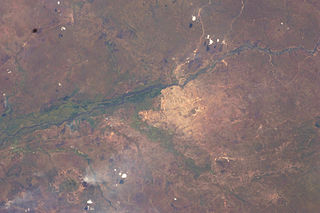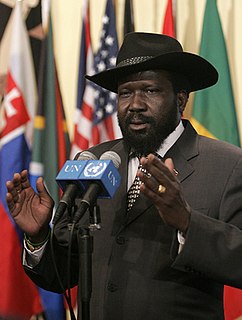
Omar Hassan Ahmad al-Bashir is a Sudanese politician who is currently the seventh president of Sudan and head of the National Congress Party. He came to power in 1989 when, as a brigadier in the Sudanese Army, he led a group of officers in a military coup that ousted the democratically elected government of prime minister Sadiq al-Mahdi after it began negotiations with rebels in the south. Since then, he has been elected three times as President in elections that have been under scrutiny for corruption. In March 2009, al-Bashir became the first sitting president to be indicted by the International Criminal Court (ICC), for allegedly directing a campaign of mass killing, rape, and pillage against civilians in Darfur.

Darfur is a region in western Sudan. Dar is an Arabic word meaning home of - the region was named Dardaju while ruled by the Daju, who migrated from Meroë c. 350 AD, and it was then renamed Dartunjur when the Tunjur ruled the area. Darfur was an independent sultanate for several hundred years, incorporated into Sudan by Anglo-Egyptian forces in 1916. The region is divided into five federal states: Central Darfur, East Darfur, North Darfur, South Darfur and West Darfur. Because of the war in Darfur between Sudanese government forces and the indigenous population, the region has been in a state of humanitarian emergency since 2003.

The East African Community (EAC) is an intergovernmental organization composed of six countries in the African Great Lakes region in eastern Africa: Burundi, Kenya, Rwanda, South Sudan, Tanzania, and Uganda. John Magufuli, the president of Tanzania, is the EAC's chairman. The organisation was founded in 1967, collapsed in 1977, and was revived on 7 July 2000. In 2008, after negotiations with the Southern Africa Development Community (SADC) and the Common Market for Eastern and Southern Africa (COMESA), the EAC agreed to an expanded free trade area including the member states of all three organizations. The EAC is an integral part of the African Economic Community.

Juba is the capital and largest city of the Republic of South Sudan. The city is situated on the White Nile and also serves as the capital of Jubek State.

Salva Kiir Mayardit is a Dinka South Sudanese politician who has been President of South Sudan since its independence in 2011. Prior to independence, he was President of the Government of Southern Sudan, as well as First Vice President of Sudan, from 2005 to 2011.

The War in Darfur, also nicknamed the Land Cruiser War, is a major armed conflict in the Darfur region of Sudan that began in February 2003 when the Sudan Liberation Movement (SLM) and the Justice and Equality Movement (JEM) rebel groups began fighting the government of Sudan, which they accused of oppressing Darfur's non-Arab population. The government responded to attacks by carrying out a campaign of ethnic cleansing against Darfur's non-Arabs. This resulted in the death of hundreds of thousands of civilians and the indictment of Sudan's president, Omar al-Bashir, for genocide, war crimes, and crimes against humanity by the International Criminal Court.

A referendum took place in Southern Sudan from 9 to 15 January 2011, on whether the region should remain a part of Sudan or become independent. The referendum was one of the consequences of the 2005 Naivasha Agreement between the Khartoum central government and the Sudan People's Liberation Army/Movement (SPLA/M).

The Sudan People's Liberation Army (SPLA) is the army of the Republic of South Sudan. The SPLA was founded as a guerrilla movement against the government of Sudan in 1983 and was a key participant of the Second Sudanese Civil War. Throughout the war, it was led by John Garang.

The Arab League has 22 member states. It was founded in Cairo in March 1945 with six members: the Kingdom of Egypt, Kingdom of Iraq, Lebanon, Saudi Arabia, Syrian Republic, and Transjordan. North Yemen joined on 5 May 1945. Membership increased during the second half of the 20th century. Five countries have observer status.

Protests in Sudan, also nicknamed as the Sudanese Intifada, began in January 2011 as part of the Arab Spring regional protest movement. Unlike in other Arab countries, popular uprisings in Sudan had succeeded in toppling the government prior to the Arab Spring in 1964 and 1985. Demonstrations in Sudan however were less common throughout the summer of 2011, during which South Sudan seceded from Sudan, but resumed in force later that year and again in June 2012, shortly after the government passed its much criticized austerity plan.

The South Sudan national football team represents South Sudan in international association football and is controlled by the South Sudan Football Association, the governing body for football in South Sudan.

The Sudanese conflict in South Kordofan and Blue Nile, also referred to by some media as the Third Sudanese Civil War, is an ongoing armed conflict in the Sudanese southern states of South Kordofan and Blue Nile between the Army of Sudan (SAF) and Sudan People's Liberation Movement-North (SPLM-N), a northern affiliate of the Sudan People's Liberation Movement (SPLM) in South Sudan. After some years of relative calm following the 2005 deal which ended the second Sudanese civil war between the Sudanese government and SPLM rebels, fighting broke out again in the lead-up to South Sudan independence on 9 July 2011, starting in South Kordofan on 5 June and spreading to the neighboring Blue Nile state in September. SPLM-N, splitting from newly-independent SPLM, took up arms against the inclusion of the two southern states in Sudan with no popular consultation and against the lack of democratic elections. The conflict is intertwined with the War in Darfur, since in November 2011 SPLM-N established a loose alliance with Darfuri rebels, called Sudan Revolutionary Front (SRF).

The foreign relations of South Sudan are the relations between the Republic of South Sudan and sovereign states and international organizations. The establishment of the relationships followed the formation of the South Sudanese state on 9 July 2011. South Sudan's former parent country Sudan became the first state in the world to recognize South Sudan.

South Sudan, officially known as the Republic of South Sudan, is a landlocked country in East-Central Africa. The country gained its independence from the Republic of the Sudan in 2011, making it the newest country with widespread recognition. Its capital and largest city is Juba.
There are conflicting reports as to the religious beliefs in South Sudan, though all agree that the three main religions are traditional African religions, Christianity and Islam. The South Sudanese President Kiir, a Roman Catholic, while speaking at Saint Theresa Cathedral in Juba, South Sudan, stated that South Sudan would be a nation which respects freedom of religion. The reported estimated relative proportions of adherents of African Traditional Religion and Christianity have varied.

The South Sudanese pound is the official currency of the Republic of South Sudan. It is subdivided into 100 piasters. It was approved by the Southern Sudan Legislative Assembly before secession on 9 July 2011 from Sudan. It was introduced on 18 July 2011, and replaced the Sudanese pound at par.
Ethnic violence in South Sudan has a long history among South Sudan's varied ethnic groups. South Sudan has 64 tribes with the largest being the Dinkas, who constitute about 35% of the population and predominate in government. The second largest are the Nuers. Conflict is often aggravated among nomadic groups over the issue of cattle and grazing land and is part of the wider Sudanese nomadic conflicts.

South Sudan–United States relations are the bilateral relations between the Republic of South Sudan and the United States of America.

















